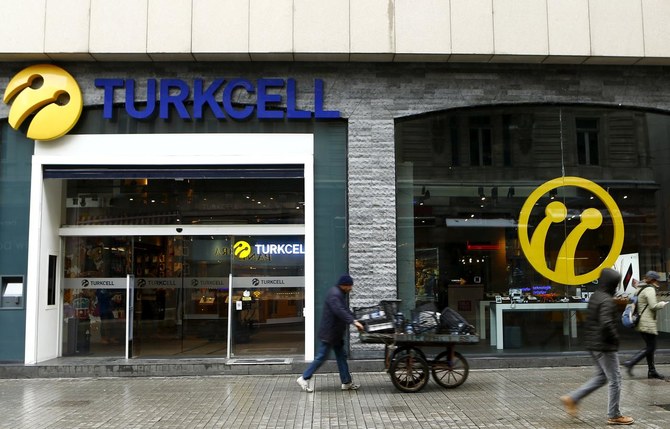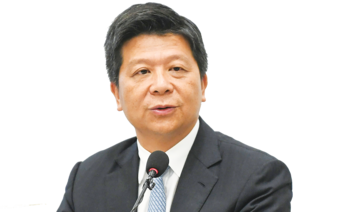ANKARA: The already rocky relationship between Washington and Ankara is further threatened by two new disputes over telecoms and pharmaceuticals.
US Secretary of State Mike Pompeo recently warned Turkey against using equipment made by Chinese telecoms giant Huawei, as the US believes it could be used for espionage, thus complicating bilateral military cooperation.
“We have to make sure that our networks are secure — that is, our defense networks, our security networks,” Pompeo was quoted as saying by the Washington Examiner. “It’s not only military and security networks that will be impacted by increasing activity inside of Turkey or any other country from Chinese networks. We’re going to make sure and protect American data.”
After Ankara’s purchase and deployment of the Russian-made S-400 missile defense system last year, the extensive use of Chinese equipment has added a new layer to the mistrust from Washington. Huawei, seen by the US and other countries as a tool for Chinese state espionage, already has access to a substantial amount of data in Turkey.
But Ankara is trying to cultivate ties with various nations to counterbalance the deterioration of the majority of its relationships with Western powers.
In February, Turkey’s top telecoms firm, Turkcell, became the first provider outside of China to sign up to Huawei’s mobile app infrastructure and cloud services. There are 4.6 million mobile users in Turkey with a Huawei ID.
In the meantime, US Ambassador to Turkey David Satterfield warned that debts owed by Turkey’s state-run hospitals to American pharmaceutical companies have climbed to around $2.3 billion from $230 million just a year ago.
Any prospect of non-payment of this debt or any request for a reduction is likely to dissuade US companies from operating in the Turkish market — especially those who sell surgical instruments or prosthetics.
“This is not a direction which serves the interests of Turkey,” Satterfield said during an online trade conference on Sept. 23.
The US raised the issue with Turkey’s top decision-makers last year, but no progress has yet been achieved. The debt dates back over three years, and the recent decline in the value of the Turkish lira has pushed the amount owed up considerably.
Murat Emir, the deputy leader of Turkey’s main opposition party, the Republican People’s Party (CHP), claimed on Thursday that the government began a new round of negotiations with the concerned US firms just after Satterfield’s warning, but that Ankara had requested a 60-percent reduction in the amount owed.
In a press statement, Emir said that neither the finance minister nor the health minister could have assuaged the ambassador’s concerns “because the treasury is emptied out. They are undermining the country’s prestige. It is a serious public health crisis amid the pandemic.”
Emre Caliskan, a research fellow at the Foreign Policy Centre in the UK, thinks Turkey’s relationship with Huawei is motivated by financial interests, but that any attempt to diversify Turkey’s suppliers from the Western system raises questions about Turkey’s motivations.
“It has been trying to be pragmatic but sometimes the country fails to sustain sharp policy changes,” he told Arab News. “The diversification of policies comes with a cost in the case of defense and technology investments. The US views Huawei as a threat to its national security and its alliances. Turkey’s attempt to buy a Chinese system would be another factor to contribute to the worsening relations between the two countries.”
Turkey expert Matthew Goldman, from the Swedish Research Institute in Istanbul, said that hostility toward China is perhaps the one issue that still enjoys bipartisan support in America.
“Pompeo is very hawkish on China, but so is Democratic Senate minority leader Chuck Schumer,” he told Arab News. “So, Ankara will have to deal with continuing US hostility against their work with Huawei.”
According to Goldman, it is likely that Turkey’s ties with China will continue to harm US-Turkey relations for some time to come, regardless of the outcome of the US election. He also thinks that, while Ankara’s purchase of the S-400 was about geopolitics, Ankara’s relationship with China and Huawei is about both geopolitics and economics.
“The current tensions with EU countries may hurt (Turkey’s) economic relations with Europe and lead Ankara to consider China a safer bet moving forward. I do not expect the US to relent in its efforts to stymie China’s projects in Turkey, but nor do I expect Ankara to stop deepening its economic and political relations with Beijing or to abandon the project with Huawei,” Goldman said.
In terms of the pharma crisis, Goldman thinks the perception that US pharmaceutical companies are threatening to abandon Turkey in the midst of a global health crisis will further damage the already frayed trust between the two countries.
“Turkish political leaders often compete to harness grievances against the US for political ends, and I do not expect them to miss this opportunity now, in the midst of so much anger and frustration about the COVID-19 crisis,” he said, adding that he expects the American pharmaceutical giants will continue to press their case with US diplomatic support.
“The fragility of Turkey’s public finances is unfortunately highlighted by this case and, unlike in the past, it can no longer count on goodwill in Washington to help sort it out. If Turkey’s economic crisis fully materializes, we will see what actions Washington and other stakeholders will take,” he said. “Until then, we can expect a deepening cycle of mistrust and missed opportunities going forward.”
Jonathan Katz, senior fellow at the German Marshall Fund of the US, thinks that deepening concerns over the activities of Beijing-controlled telecom corporations including Huawei are a top priority for the US government — with shared bipartisan concerns in the US Congress, where many view those activities as potentially undermining democracy and threatening global security.
“Turkey has already shown its willingness to risk its relationship with the US and its NATO allies with the S-400 purchase and now Erdogan will also be judged on Turkey’s deepening engagement with China,” Katz told Arab News.
Katz thinks it unlikely that the US election will change the trajectory of growing US and European concerns and policies regarding Turkey.
“This is not a symbolic warning for Erdogan and Turkish leaders in Ankara. They will need to take Secretary Pompeo’s concerns and warnings seriously,” he said.


























